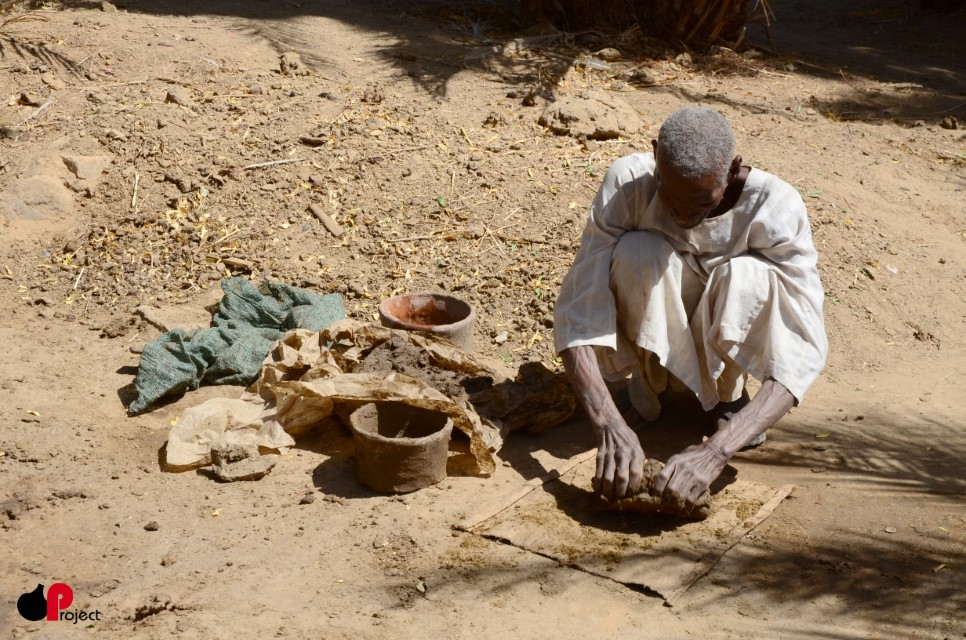Traditional pottery workshops can be very informative for archaeologists working with pottery. This disappearing craft was documented as part of an archaeological expedition of the Polish Centre of Mediterranean Archaeology of the University of Warsaw working in Sudan. The footage is now available on the PCMA UW channel on You Tube.
The “Pots Project” was initiated in 2016 by Ewa Czyżewska-Zalewska (PCMA UW) and Zofia Kowarska. Both are archaeologists with a special interest in ceramics. They are involved in the Early Makuria Research Project (EMRP) directed by Prof. Mahmoud El-Tayeb (PCMA UW). The EMRP has been researching the beginnings of the Kingdom of Makuria through investigations of tumulus cemeteries between the 3rd and 4th Nile cataracts, at the sites of El-Zuma, El-Detti and Tanqasi.
Some of their research questions concerned the provenance of the pottery discovered in the burials. – “One of the possible ways to determine if we are dealing with a local pottery production is to compare the fabric of the archaeological vessels with locally sourced clays” – explains Czyżewska-Zalewska who is the EMRP chief ceramologist. This, along with a desire to document and preserve the local tradition of pottery-making, was at the core of the “Pots Project”.
During archaeological fieldwork in 2016 and 2018, Czyżewska-Zalewska and Kowarska visited three pottery workshops still operating in the vicinity of the archaeological sites. To obtain information on the pottery-making techniques, they interviewed local potters while observing the technological process of vessel shaping and firing. They also collected clay samples for analyses.
The interviewed potters operated within a c. 15 km radius, but despite their workshops’ proximity, each of the potters used a slightly different technique and set of tools stemming from a different pottery-making tradition. The results of these interviews were published in an article in the International Journal of Historical Archaeology. Now the footage from these visits has been published as films with commentaries by the “Pots Project” team.
Place: DAHASYRA
The potter: El-Zahara Adam Hamad El-Niama
“The potter’s name is El-Zahara Adam Hamad El-Niama. She is about 80 years old and comes from Northern Kordofan, from the village of Jabrat El-Sheikh. According to El-Zahara, there is no local pottery tradition in her native Jabrat El-Sheikh region, because it lacks appropriate clay sources. But she learned her pottery skills from women who originally came from Jabrat el-Sheikh and whom she met harvesting dates in El-Dahasyra. She explains that the women who taught her had themselves learned how to make pottery in Omdurman, in Fitehab, in the south-western part of the city, where the pottery-making tradition is supposed to be rooted since many generations.
- Czyżewska-Zalewska, Z. Kowarska (2016), The Pots Project: Handmade pottery workshop in El-Dahasyra (Sudan) [link to film]
Place: KURAJMA BARKAL
The potter: Mohammad Idris Mohammad Idris
Mohammad lives in Tanqasi but his family immigrated to Sudan from Chad. He is of the Gorane ethnic group. He has been a potter for 17 years. He learned the craft for six months from a man from Sennar. Mohammad was the first in his family to take up this trade, it was not a family tradition. He works alone and is the only person in his family working with pottery. He makes vessels to order, either in his workshop or at the customer’s place. He took up pottery to earn money but it is his sideline. His main occupation is trade in metal from Omdurman.
- Czyżewska-Zalewska, Z. Kowarska (2018), The Pots Project: Handmade pottery workshop in Karima (Sudan) [link do filmu]
Place: TANQASI SUQ (AR RU RAJS)
The potter: Abbas Atalfadil Fatha Rahman
The potter was born In 1938 and he has been making pots since 1950. He says that he likes his job. Pottery-making is a family tradition – he learned it at his father’s side, like his father before him. According to his knowledge, they were all natives of Tanqasi, so the pottery tradition is local to Tanqasi. In his family, only men worked with pottery. He has seven daughters and three sons but none of the boys wanted to learn the craft and continue the tradition.
- Czyżewska-Zalewska, Z. Kowarska (2018), The Pots Project: Handmade pottery workshop in Tanqasi (Sudan) [link to film]
The first results of the project have been published in: Czyżewska-Zalewska, E., Kowarska, Z. Modern and Ancient Pottery Traditions in the el-Zuma and Karima Region in Sudan: An Introduction to Comparative Studies (Pots Project). Int J Histor Archaeol 24, 571–588 (2020). https://doi.org/10.1007/s10761-019-00524-9

